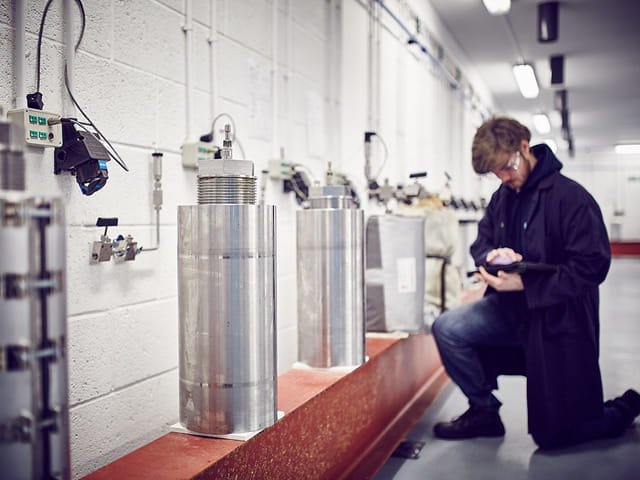Ensure decades of material reliability, even in extreme environments. Element's suite of world-class High-Pressure, High-Temperature HPHT testing services are trusted globally by Energy, Aerospace, and Petrochemical leaders and can help you rigorously assess material performance for long-lasting, successful projects.
What is High Pressure High Temperature (HPHT) testing?
HPHT testing, also known as Autoclave Testing, simulates extreme downhole or service conditions by subjecting materials to high pressure (HP) and high temperature (HT). This critical evaluation process assesses material performance for applications like oil & gas production and Carbon Capture and Storage (CCS, CCUS). By mimicking real-world stresses, HPHT testing ensures materials can function reliably and safely in these demanding environments. These tests can be applied across a range of applications, including metals, alloys, polymers, composites and coatings.
Key benefits of HPHT testing with Element
- Reach regulatory compliance: Our testing and analysis services align with stringent industry regulations, including ISO, API, and NACE standards, ensuring you remain compliant with safety and quality requirements.
- Worldwide Accessibility: Our HPHT laboratories in the UK, US, and Europe ensure you have convenient, accessible, and scalable testing solutions.
- Streamlined and Adaptive Testing: Our extensive testing capabilities cover mechanical, thermal, and chemical analysis, guaranteeing meticulous material characterization for every project requirement. We optimize resource allocation by using adaptable testing platforms with multiple large vessels and smaller units, enabling simultaneous testing and ensuring you receive a faster result.
- Tailored Solutions: With extensive experience in designing and operating fixtures for client-specific HPHT tests, we offer a range of bespoke solutions, including Sour rapid gas decompression of elastomers and thermoplastics such as XHPHT (2000 bar), (300°C), visual observation in pressurized fluids, permeation, diffusion studies, and cold testing.
Reduce Material Failure with HPHT testing
Selecting suitable materials for harsh environments can be challenging. Material failure can lead to costly downtime, repairs, and safety hazards. Element's reliable HPHT testing services remove the guesswork from material selection. We replicate real-world conditions in a controlled lab setting, allowing you to confidently predict the long-term performance of critical components like pipes, connections, vessels, insulation, seals, and coatings made from plastics, rubbers, and composites. We subject these materials to specific combinations of liquids and gases (including H2S, H2, acids, bases, hydrocarbons, and specific mixtures), temperature variations, and pressure fluctuations, mimicking the extreme conditions they may encounter in your application. This rigorous testing process helps you avoid costly surprises and ensures your materials maintain their integrity and functionality long term.
Ensure Material durability with pre and post-exposure analysis
Do you need to know how your materials will perform in demanding applications? Elements' pre-exposure analysis accurately predicts how various materials, including plastics, rubbers, composites, and metals, will respond to extreme pressure, temperature, and chemical exposure. We also conduct post-exposure evaluations and failure analyses to confirm material durability and ensure they can withstand the real-world stressors encountered in your specific application. This comprehensive testing approach empowers you to optimize material performance for reliable equipment operation and produce safe, dependable products.


HPHT Testing Services and Capabilities
Element offers a comprehensive suite of HPHT testing services designed to rigorously evaluate material performance under simulated downhole or service conditions. These tests expose materials to extreme pressure, temperature, and chemical environments, allowing you to confidently predict their long-term behavior and optimize material selection for critical applications. Our core HPHT testing services covering:
HPHT Testing of Polymeric Materials:
- Compatibility Testing: Evaluate the long-term compatibility and performance of polymers, elastomers, and composites used in seals, gaskets, flowlines, and pipe liners. This testing assesses material stability when exposed to a wide range of production fluids, including harsh sour environments, sweet environments, and multiphase mixtures.
- Accelerated Aging: Employ elevated temperatures and/or chemical exposure to predict material performance over extended service life.
- Rapid Gas Decompression (RGD): Simulate the rapid pressure drops experienced during wellbore unloading events, allowing you to assess a material's resistance to decompression-induced damage.
- Cyclic Pressure & Temperature Testing: Assess the performance of rubber O-rings under realistic downhole conditions by subjecting them to repeated cycles of pressure and temperature variations. This test evaluates the material's ability to maintain sealing integrity and dimensional stability in dynamic environments.
HPHT testing of Metallic Materials:
HPHT testing is required to evaluate the Stress Corrosion Cracking (SCC), pitting and crevice resistance of Corrosion‐Resistant Alloys (CRAs) exposed to harsh sour service (H2S) and sweet service (CO2) environments in the Oil & Gas industry. Element performs HPHT testing to qualify materials to the requirements of NACE MR0175 / ISO 15156.
Our HPHT testing includes autoclave facilities with the following capabilities:
- World-class scale; HPHT laboratories in the UK, US and Europe
- Stress Corrosion Cracking (SCC), Pitting and Crevice tests up to 250° C and 300 bar
- Autoclave Slow Strain Rate (SSR) and Rippled Slow Strain Rate (RSSR) testing
- Customer-specific services; advice and guidance, consultancy and bespoke testing programs
Post-Exposure Services:
Following HPHT testing, Element provides a comprehensive suite of post-exposure services to assess material properties and identify potential degradation mechanisms:
- Chemical Analysis (FTIR): Identify before and post-test material composition and degradation products.
- Thermal Analysis (TGA/DSC): Assess thermal stability, decomposition behavior, glass transition, crystallinity through combined weight and heat flow measurements.
- Thermo-Mechanical Properties (DMA): Measure changes in material properties such as stiffness, modulus, and damping characteristics as a function of temperature, time, and frequency before and after HPHT exposure.
- Thermal conductivity measurement: Assess the impact of HPHT exposure on a material's thermal conductivity, a critical factor for heat transfer applications.
- Electrical Properties: Evaluate changes in electrical conductivity and other electrical properties after HPHT exposure, relevant for electrical components.
- Microscopic Analysis: Employ optical and electron microscopy to examine the microstructure of the material and identify any microstructural changes induced by HPHT exposure.
- In-Situ Friction Testing: Assess the tribological properties of materials under simulated downhole or service conditions. This test replicates the specific temperature, pressure, environment, media, force, and speed experienced by the material in real-world applications. By measuring the coefficient of friction and mass losses of materials under these conditions, you gain valuable insights into the material's ability to perform reliably in terms of wear and tear.
- Mechanical Testing: Evaluate changes in material properties like flexural, tear, tensile strength, yield strength, and elongation after HPHT exposure.
Why Choose Element?
With over 25 years of experience, we are your HPHT testing choice in the Energy, Aerospace, and Petrochemical industries. We specialize in qualifying materials for extreme conditions and can accurately replicate harsh subsea oil and gas production environments. We pride ourselves on delivering meticulous testing, analysis, and materials evaluation to ensure equipment durability. Benefit from short lead times and fast turnaround, covering polymers, metals, and coatings with tailored solutions available. Trust us for accurate data to drive your decision-making process. Contact Element today to discuss your HPHT testing needs or learn more about our experts.
Whitepaper: Rapid Gas Decompression (RGD) Tests Involving Hydrogen Sulfide
This white paper demonstrates that H2S is a more hostile gas than CO2 towards housed elastomeric seals subjected to repeated pressure cycling in RGD tests.
Read MorePredicting component life with corrosion modeling
Erosion within oil and gas pipelines is a serious problem. Corrosion modeling using the Computational Fluid Dynamic method can accurately predict the location of burn-throughs.
Read MoreOur Services
Element has a comprehensive range of services for HPHT testing.
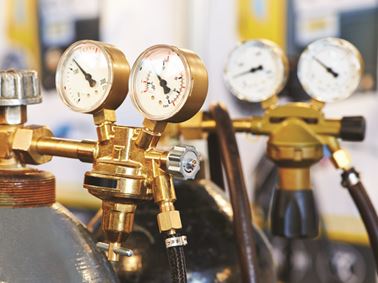
Rapid Gas Decompression Testing (RGD)
Element offers rapid gas decompression testing to help manufacturers and users of elastomers better understand the behavior of this material in true sour RGD conditions.

Dynamic Mechanical Analysis Testing (DMA)
Element's dynamic mechanical analysis (DMA) is a powerful tool for understanding the thermal and mechanical properties of polymeric materials.
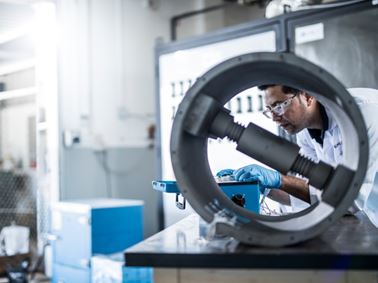
Sour Service Corrosion Testing
Element is one of a few ISO certified sour service labs in the world, providing sour service corrosion services for a variety of test types including NACE MR0175/ISO 15156.
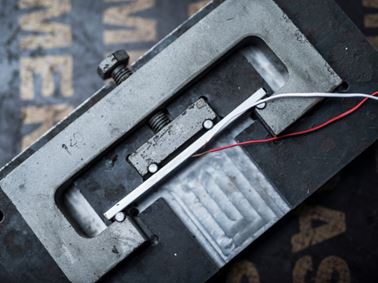
Stress Corrosion Cracking (SCC) Testing
Element’s Stress Corrosion Cracking (SCC) testing evaluates the susceptibility of metals to cracking failure under tensile stress and corrosion.
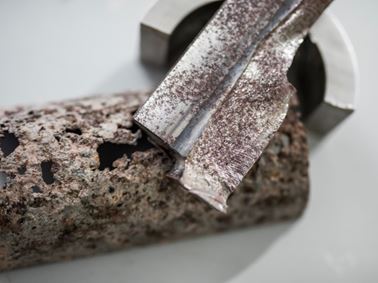
Pitting & Crevice Corrosion Testing
Element’s ASTM G48 corrosion testing ensures the quality of material and resistance to pitting and crevice corrosion in ambient, elevated pressure and chloride environments.
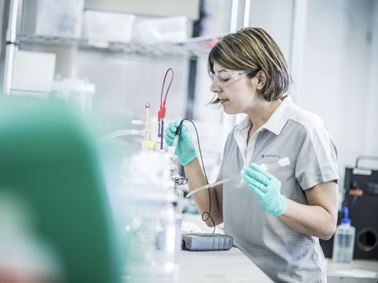
Electrochemical Corrosion Testing
Element’s electrochemical corrosion testing services evaluate the corrosion resistance of implantable devices. Our labs offer cyclic potentiodynamic polarization testing per ASTM F2129 to determine the corrosion susceptibility of medical devices.
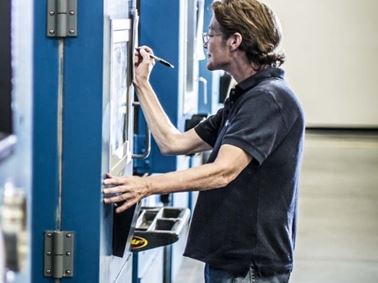
Thermal vacuum testing
Element's thermal vacuum testing allows for the simulation of space and upper atmosphere conditions, including temperature and altitude.

Corrosion Inhibitor Testing
Element’s corrosion inhibitor testing experts select the most suitable corrosion inhibitor to protect your assets and extend their life span within the energy industry.
